
•Candy takes advantage of a variety of learning opportunities: She reads
the extra assignment, looks for resources online, watches PBS, and asks
questions in class. Candy is enthusiastic and curious.
•Noi considers how to apply what she has learned in books and in class to
her life. Noi extends her knowledge to other applications.
•Drew hates making mistakes but tries to learn from them, make the best
of things, and accept that taking risks may involve failure. Drew can
turn lemons into lemonade.
Create an Attitude that Invites Success
Be sure to create the right attitude about study and especially about
reading—students do a lot of it! If you have something challenging
to read and you tell yourself, “I’ll never understand this,” chances
are that you won’t. You have conditioned yourself for failure.
Instead, condition yourself for success. Give yourself affirmations
such as:
• “No matter how hard the reading level, I will learn something
from this.”
•“I will become a better reader with each reading task.”
•“I can understand and I will remember.”
Have a positive attitude about your reading material, too. If you tell
yourself, “This is going to be boring,” you undermine your chances
for learning and enjoying. Even if you are not interested in the topic
you have to read about, remember that you are reading it for a reason:
You have something to gain. Keep your goals clearly in mind.
Remember, it’s OK to reward yourself when you have completed a
difficult reading assignment. (And the knowledge you gain from the
reading is also its own reward.)
What if you have mastered the right attitude, but still can’t con-
centrate on your studies? Maybe you should look into mastering brain
interference, too!
WHAT EXACTLY IS BRAIN
INTERFERENCE?
Can you focus on the task in front of you? Do you know how to elim-
inate brain interference?
Mastering Your Study Environment 49

In Study Smarts, authors Judi Kesselman-Turkel and Franklynn
Peterson suggest that the most effective tip for concentrating is
to eliminate “brain interference”—whatever distracts you from
your ability to focus. Brain interference can range from being
in love to wondering if your sister’s birthday is on Monday or
Tuesday.
Try these suggestions to free your brain from interference:
• If you are hungry, cold, hot, or sleepy, take care of it.
•If you are a nibbler, have healthy snacks nearby before you start
to study.
•If you have nervous habits, such as twirling your hair or biting your
nails, ask yourself if they calm you or distract you. If they distract
you, think of a non-distracting substitute, such as holding a high-
lighter in your hand.
•If you need to have music or noise in the background, try Mozart
or white noise. Music by Mozart has been proven to adjust brain-
waves to their most receptive state; studying while listening to the
Sonata for Two Pianos in D Major the night before exams
improved students’ test scores! For white noise, try turning on
a fan to create a consistent background noise that will mask
any interrupting noises (TV in another room, your little
brother’s play group) that could occur as you settle in for a study
session.
•If you keep thinking about irrelevant details (deadlines, questions
to ask your coach, lyrics to a song), write them down, make lists,
and keep a written or electronic calendar so that you can focus on
studying instead.
•If you are studying courses with similar concepts, such as physics
and calculus, you should separate them on your study schedule to
keep vocabulary and formulas clear.
•If you are experiencing emotional interference—you are angry at
your teacher or in trouble with your dad—talk it out with a friend,
parent, or mentor.
•If you are anxious about passing a chemistry course, your anxiety
may actually help motivate you to remember better. However, if
you are anxious about a dentist appointment, turn your thinking
back to studying.
50 10 SECRETS TO ACING ANY HIGH SCHOOL TEST

NURTURE CONCENTRATION
Do you know someone who can concentrate with laser-like attention?
Some of us can do this naturally, but most of us need to set the stage
for good concentration. Since good concentration leads to more effi-
cient studying, which leads to more effective test taking, consider
these steps:
1. Make yourself a special study spot: Roy studies on the side table in
his mom’s home office. (Read more on special study spots later in this
chapter.)
2. Choose one goal at a time—a small, specific, and reasonable
task: Gia is memorizing the first half of the Periodic Table of the Ele-
ments.
3. Prepare the space for work—gather a dictionary, calculator,
and extra paper—and then begin: Jason made sure he had 3 sharp-
ened pencils for his practice exam.
4. When you finish a task, leave your study spot and take a
break: Rachel walked to the kitchen for some orange juice and a chat
with her dad.
5. Gradually increase the amount of work you want to get done
in a study session: Tomoyuki discovered that, with practice and
breaks, he could study for his SATs for an entire afternoon without los-
ing concentration.
The idea is to reward yourself for good concentration. Too many of us
work until we can’t concentrate any longer and aren’t getting much
done, and then we take a break. When you think about it, this is
merely rewarding bad concentration.
SOURCES IN CYBERSP
SOURCES IN CYBERSPACE
ACE
Concentration Sites
Check out this URL for a list of links to sites and articles on how
to concentrate when studying. There are some excellent tips to try.
•www.howtostudy.org/resources/conc/index.htm
Mastering Your Study Environment 51

Article titles include:
•Concentration and Reading
•Concentration and Your Body
•Studying with Intensity
•Concentration and Distraction
DID WE MENTION TO MAKE TIME FOR
STUDY BREAKS?
Why not make time for a study break after each hour or after a rea-
sonable task is finished? If you do, you will definitely be able to retain
more information, and your body will feel less tension. Again, you are
rewarding yourself for good concentration—for putting in those 60
minutes of study effort!
For every hour of study, Evan does two reps of his stretching rou-
tine. He likes the feeling of renewed energy and of doing something
physical between the mental exercises.
Berta takes a short five-minute break after reading a textbook
assignment. She finds that when she writes down her summary after
the break, she remembers more of what she read and how it fits into
the big picture.
Hector closes his eyes for ten minutes between studying different
subjects. Some basic yoga breathing and meditation make him feel
refreshed and help separate the subjects in his mind.
Finally, let’s be realistic. Do you ever have trouble resisting the urge
to slack off? It might help to remember these words of Victor Frankl,
founder of one of the Vienna schools of psychology:
Live as if you were living already for the second time and as if you had acted
the first time as wrongly as you are about to act now! It seems that there is
nothing that would stimulate a man’s sense of responsibility more than this
maxim, which invites him to imagine first that the present is past and, second,
that the past may yet be changed and amended. Such a precept confronts him
with life’s finiteness as well as the finality of what he makes out of both his life
and himself.
—Victor Frankl, “Logotherapy in a Nutshell,” Man’s Search for Meaning
YOUR SPECIAL STUDY SPOT
Have you ever noticed where kids study in your high school? Out on
the lawn, in the hallways, draped over a bleacher bench, in a noisy
52 10 SECRETS TO ACING ANY HIGH SCHOOL TEST

Mastering Your Study Environment 53
classroom, in the cafeteria line, at the bus stop—maybe even some-
times in study hall and the library.
If you feel that these places don’t offer you a place to settle down
and spread out your notes with a minimum of distractions, find your-
self a special study spot. You can even designate one at home and one
at school.
At home, the ideal location is one you can call your own—where
you can retreat to study and where you can leave your “stuff.” Some
ideas for a special study spot at home are:
•a corner of the kitchen or den
•a desk or table in your room
•a cleaned-up area in the garage, basement, or attic
•a large walk-in closet that you have converted into a study
Remember, you will want to be in a well-lit area where you are com-
fortable and where you can have your books and papers or computer
in easy reach. Add plants or a stick of burning incense if they relax
you. Put away or turn off every distraction that might take your mind
off of the task ahead! Ask your family not to disturb you or bring you
the phone when you are in your study spot.
The Ambience of Your Study Spot
Webster’s defines ambience as “an environment or its distinct atmos-
phere.” The environment you study in is a crucial element of your
academic success. One experiment in study ambience moved a small
group of students from a loud, busy room into a quiet study area,
where they accomplished in three hours what had previously taken
ten hours!
Your study location may vary. Sally studies at the desk in her bed-
room, and Lionel sits against an old tree in the park. In addition
to location, the elements that comprise the ambience of your study
area are:
•noise or silence
•kind of noise (music, whispering, TV, footsteps in a library)
•lighting (where, what kind, how bright)
•your view (a wall, the woods outside the window)

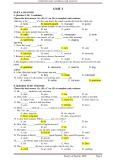
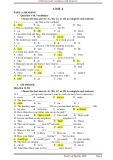
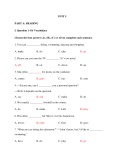
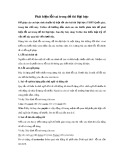
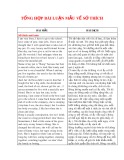
![Bộ tài liệu học vỡ lòng Tiếng Anh [mới nhất]](https://cdn.tailieu.vn/images/document/thumbnail/2020/20200504/lanxichen/135x160/1651588587086.jpg)
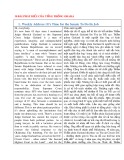
![Đề cương Tiếng Anh phổ thông [năm học]: Tổng hợp đầy đủ nhất](https://cdn.tailieu.vn/images/document/thumbnail/2019/20190717/thukhuyen1257/135x160/7691563342337.jpg)
![10 modals là gì? [Năm hiện tại]](https://cdn.tailieu.vn/images/document/thumbnail/2018/20181029/hongduc7981/135x160/3551540823056.jpg)
![Tài liệu Ôn tập tiếng Anh [chuẩn nhất/mới nhất]](https://cdn.tailieu.vn/images/document/thumbnail/2018/20181013/soandethi/135x160/9551539429153.jpg)



![Từ vựng tiếng Anh về thức ăn và giảm cân [mới nhất, đầy đủ]](https://cdn.tailieu.vn/images/document/thumbnail/2025/20251217/nglinh.diamond@gmail.com/135x160/53091766028543.jpg)


![Tài liệu Từ vựng tiếng Anh Trung cấp [mới nhất]](https://cdn.tailieu.vn/images/document/thumbnail/2025/20250913/nguyentuan250421@gmail.com/135x160/99491757910839.jpg)
![Tài liệu Từ vựng Tiếng Anh theo chủ đề [mới nhất]](https://cdn.tailieu.vn/images/document/thumbnail/2025/20250913/namdhuet@gmail.com/135x160/83251757753810.jpg)



![Tài liệu Từ vựng tiếng Anh cho bé [chuẩn nhất/mới nhất]](https://cdn.tailieu.vn/images/document/thumbnail/2025/20250731/huadaithesang2509@gmail.com/135x160/18631754013896.jpg)



